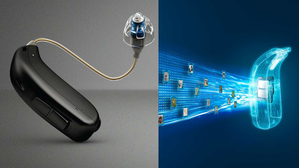New Delhi, March 3 (IANS) Artificial Intelligence-(AI) enabled hearing devices can revolutionise solutions for people living with hearing impairment, said experts here on World Hearing Day on Sunday.
World Hearing Day is observed every year on March 3 to raise awareness about hearing impairments as well to fight social stigmas.
About 430 million people worldwide suffer from hearing loss, as per estimates from the World Health Organization (WHO).
While currently, one in four people over 60 are impacted by hearing loss, by 2050, it could impact one in ten people, including millions of children and young adults.
“Now, the world is becoming more and more dependent on hearing aids. The ear plays an important role in amplifying sound and converting sound into neural pulses. But those pulses are sent to the brain, which is where AI-enabled advanced hearing aids help,” Dr. Aparna Gupta, Associate Director, Neurology, Indian Spinal Injuries Centre (ISIC), New Delhi, told IANS.
Dr. Virendra Singh, Senior Consultant, ENT, Sri Balaji Action Medical Institute, New Delhi said that they take up surgery as one of the options, but with some limitations, advanced AI-based hearing aids are breaking sound barriers these days.
“Hearing aids stand as a beacon of hope. Through coordinated efforts between ENT specialists, audiologists, the hearing aid industry, and governmental support, we can ensure that no one is left in silence. Advanced devices can bridge the gap between silence and symphony,” added Dr. Singh.
India is also confronted with a formidable challenge as hearing loss impacts millions of people spanning various age brackets. The WHO reports that roughly 63 million individuals in India grapple with notable auditory deficiencies, emphasising the critical requirement for viable remedies and disruptions.
As India’s elderly populace is forecasted to double by 2050, surpassing the number of children who are also these days prone to hearing loss, the incidence of hearing impairments is anticipated to escalate, accentuating the necessity for preemptive actions to tackle this urgent health concern.
Dr. Aparna noted that hearing is also crucial to a person’s health and well-being.
“When you live with hearing loss, the brain uses sound dysfunctions and neurons tend to die out if you’re not sending the signals. Hence, it is important to understand what’s going on in the brains of hearing-impaired patients. Moreover, a growing body of research and assessments is revealing the connection between early-stage Alzheimer’s, stroke, depression, and auditory well-being,” she explained.
Despite millions grappling with hearing loss worldwide, the adoption rate for hearing aids remains surprisingly low, barely surpassing 10 per cent. This is majorly due to high cost devices as well as social stigma, said the experts.
“While issues such as access and affordability undoubtedly factor into this equation, stigma also plays a significant role in perpetuating this disparity. Many people associate hearing aids with outdated stereotypes, mistakenly believing they are exclusively for the elderly or those with disabilities,” said Brandon Sawalich, President and CEO of Starkey, a global hearing technology company.
He said that however, today’s technology has transformed hearing aids, enhancing people’s lives and improving their hearing.
The introduction of AI-enabled hearing aids thus marks a significant stride in tackling hearing impairment. These cutting-edge devices provide unmatched sound clarity, health monitoring features, and a tailored user interface, heralding a new era in hearing aid technology.
Experts said that AI allows processing of sounds in a way that can enhance speech, reduce noise, and delineate all different complexities of sound 80 million times an hour without the patient doing anything. AI is helping hearing aids perform their core functions of helping people hear better.
–IANS
rvt/dan
Disclaimer
The information contained in this website is for general information purposes only. The information is provided by TodayIndia.news and while we endeavour to keep the information up to date and correct, we make no representations or warranties of any kind, express or implied, about the completeness, accuracy, reliability, suitability or availability with respect to the website or the information, products, services, or related graphics contained on the website for any purpose. Any reliance you place on such information is therefore strictly at your own risk.
In no event will we be liable for any loss or damage including without limitation, indirect or consequential loss or damage, or any loss or damage whatsoever arising from loss of data or profits arising out of, or in connection with, the use of this website.
Through this website you are able to link to other websites which are not under the control of TodayIndia.news We have no control over the nature, content and availability of those sites. The inclusion of any links does not necessarily imply a recommendation or endorse the views expressed within them.
Every effort is made to keep the website up and running smoothly. However, TodayIndia.news takes no responsibility for, and will not be liable for, the website being temporarily unavailable due to technical issues beyond our control.
For any legal details or query please visit original source link given with news or click on Go to Source.
Our translation service aims to offer the most accurate translation possible and we rarely experience any issues with news post. However, as the translation is carried out by third part tool there is a possibility for error to cause the occasional inaccuracy. We therefore require you to accept this disclaimer before confirming any translation news with us.
If you are not willing to accept this disclaimer then we recommend reading news post in its original language.












